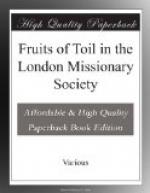In Kafirland, in districts within the English dominion, the Society has five stations, in most of which there is fair access to a population still heathen. In each a Christian Church has been gathered; the members are nine hundred in number, and the congregations contain nearly four thousand persons. Four English missionaries have charge of these missions, and a Native Pastor, the Rev. A. Van Rooyen. These missions, however, are surrounded by the agencies of other Missionary Societies; and they have not that full scope for development which is desirable, and which they possessed in earlier years. It is among the Bechuana missions, that enlargement is most practicable.
For twenty years the Mission Station at the Kuruman, with its immediate neighbours, stood forth, the last of the border lighthouses on the shore of that wild sea of savage life and savage wars, which stretched northward without a break to the unpeopled Sahara. Then for nine years Livingstone maintained a station beyond it among the Bakwains. In 1859, in two bands, our brethren entered the wilderness, to found new Missions among the Makololo and the Matebele. Strange disasters broke up the first. The second was established successfully at Inyati, and has grown in strength and influence. Two others have since been fixed at intermediate stations between the Kuruman and Inyati: and thus a chain of Missions, at intervals of three hundred miles, has been carried onwards into the centre of savage heathendom, and to the neighbourhood of the Victoria Falls. Amid powerful difficulties our brethren have not laboured in vain. They have had to contend with inveterate prejudices; they have been preaching lofty truths to minds which, in religion, are on the level of childhood, yet, in wickedness, have the experience of age. Still they have held on. In perils of journeys; in perils of sickness; in perils of the wilderness; in abundant labours; in privations; in loneliness; they have lived on, if by any means they may save some.
The death of Moselekatse is no common event among the South African tribes. His career has had a terrible effect upon their numbers, their position and their history. Leader of a tribe of Zulu Kafirs, about 1816 he was driven from his own country by the anger of Chaka, the savage head of the nation, and began to carve out an inheritance for himself in new lands. Brave, bold, and shrewd, he knew how to grasp opportunities, to make use of the right men, to reward fidelity generously, and summarily to stamp out opposition. Throughout life he had a wonderful influence over both nobles and people. His army was disciplined; and its courage was stimulated by stirring songs. In the little court-yard of this African lion, the yells of battle, the cries of the wounded, the shouts of victory were imitated, and the stories of brave deeds were told by rude minstrels, as effectively as, in old days, in Scandinavian halls.




